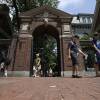In the summer of 2014, protests erupted in cities across America after the deaths of two unarmed black men at the hands of police — Eric Garner in New York, who famously pleaded with a policeman "I can't breathe" and 18-year-old Michael Brown in Ferguson, Mo. Last week’s police killing of George Floyd in Minneapolis has sparked a new wave of protest, but participants in Boston this weekend said it feels more urgent this time around.
"It does feel different," said Patrick Lee of Boston as demonstrators gathered Sunday at Boston City Hall before marching to the State House. "There’s more of an urgency of the moment because we’re under attack from so many more fronts than we were then."
Speaking behind a mask, Lee said the country at the start of the Black Lives Matter Movement was led by a president who empathized with suffering. "Eight years ago there was hope and now it just seems like great despair," he said.
Part of that despair arises from the coronavirus pandemic, said Rahsaan Hall, director of the racial justice program for the ACLU of Massachusetts.
"The vulnerability of black lives has always been central to the American narrative," Hall said. "What makes this different is that this long narrative has reached a point where we are experiencing this in the midst of a global health pandemic that is framed by these deep racial injustices and disparities."

And part of it arises from President Donald Trump's response, Hall said.
"There are some who desire to look to the highest office in the land for a sober and resolute indicator of the path forward," he said. "But have been left wanting."
On Monday even Republican Gov. Charlie Baker — who generally avoids directly criticizing Trump — said the president has failed to provide “compassion and leadership” in recent weeks.
This sentiment was broadly echoed at Sunday’s protest. Some of the people in the crowd have marched under these banners for a decade, but said they found this moment to be strangely unique and ominous.
"The country’s in freefall," said a woman named Catherine, who declined to give her last name. "There’s a lot of people unemployed. There’s a lot of people in pain. I think there’s leadership that says ‘direct your pain against minorities.’ And so, I think minorities are taking the brunt of all the anger and the frustration."
Tom Revay of Cambridge said progressives are also angry. "I don't feel the least bit secure in what's happening at our national government right now," Revay said. "And obviously we're all masked up here. So, I mean, I'm concerned for the health of everybody here. But you can see how cooped up people are — how angry they are on so many levels. I think this is far worse than it was eight years ago."
But Deborah Herman of Cambridge — carrying a Black Lives Matter sign — expressed a sentiment that she admitted could come as a surprise to many observers of protests and politics raging across the country: optimism.
"I think people are much more united than they were before," Herman said. "The pandemic brought out our compassion. And everybody is suffering in some way. And then when something like this happens, it moves our hearts. I think we're more united than divided. I really do."
But Fitz LaMarre, a black artist from New Bedford, said he doesn’t believe the nation has made progress towards unity since 2014. But he does believe that the police killing of George Floyd is serving as a rallying point for people who believe in social justice.
"I feel we have more allies, like genuine," LaMarre said. "The turnout that we had here, there was there's a lot of, a lot of Caucasian folks, and I wasn't expecting that as much, but I'm happy to see it. And it moved me ... hearing 'Black Lives Matter' come out of white faces. That's the difference! "





